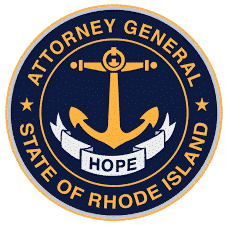

PROVIDENCE, RI —On Oct. 23, Rhode Island reached a $5.4 million agreement with pharmaceutical distributor Reckitt Benckiser Group settling allegations the company improperly marketed and promoted Suboxone, resulting in improper expenditures of state Medicaid funds.
Attorney General Peter F. Neronha announced the settlement Monday.
Neronha’s office noted $2.9 million of the settlement will be returned to the State’s Medicaid administrator, the Executive Office of Health and Human Services, and $2.4 million will be returned to the Federal Government.
Rhode Island’s share of the settlement is part of a larger $700 million settlement that Reckitt has paid to resolve various civil fraud allegations impacting Medicaid and other government healthcare programs.
Suboxone is a drug approved for use by people recovering from opioid addiction to avoid or reduce withdrawal symptoms while they undergo treatment. Suboxone and its active ingredient, buprenorphine, are powerful and addictive opioids.
Reckitt is an English public limited company headquartered in Slough, England. Until Dec. 23, 2014, Reckitt’s wholly owned subsidiary Indivior Inc. (then known as Reckitt Benckiser Pharmaceuticals, Inc.) distributed, marketed, and sold Suboxone Sublingual Tablets and Suboxone Sublingual Film in the United States. In Dec. 2014, Reckitt spun off Indivior Inc. The settlement described in this statement is with Reckitt only.
The state alleged that from 2010 through 2014, Reckitt, directly or through its subsidiaries, knowingly:
- Promoted the sale and use of Suboxone to physicians who were writing prescriptions:
-
- To patients without any counseling or psychosocial support, such that the prescriptions were not for a medically accepted indication
- For uses that were unsafe, ineffective, and medically unnecessary and that were often diverted for uses that lacked a legitimate medical purpose.
-
- Promoted the sale or use of Suboxone Sublingual Film based on false and misleading claims that Suboxone Sublingual Film was less subject to diversion and abuse than other buprenorphine products and that Suboxone Sublingual Film was less susceptible to accidental pediatric exposure than Suboxone Sublingual Tablets
- Submitted a petition to the Food and Drug Administration on Sept. 25, 2012 fraudulently claiming that it had discontinued manufacturing and selling Suboxone Sublingual Tablet “due to safety concerns” about the tablet formulation of the drug.
- Took other steps to fraudulently delay the entry of generic competition for various forms of Suboxone in order to improperly control pricing of Suboxone, including pricing to federal healthcare program.
A National Association of Medicaid Fraud Control Units (“NAMFCU”) Team, of which Rhode Island is part, participated in the investigation and in settlement negotiations.
Learn more about the Medical Fraud and Patient Abuse Unit at the Rhode Island Office of the Attorney General.
This is a test
